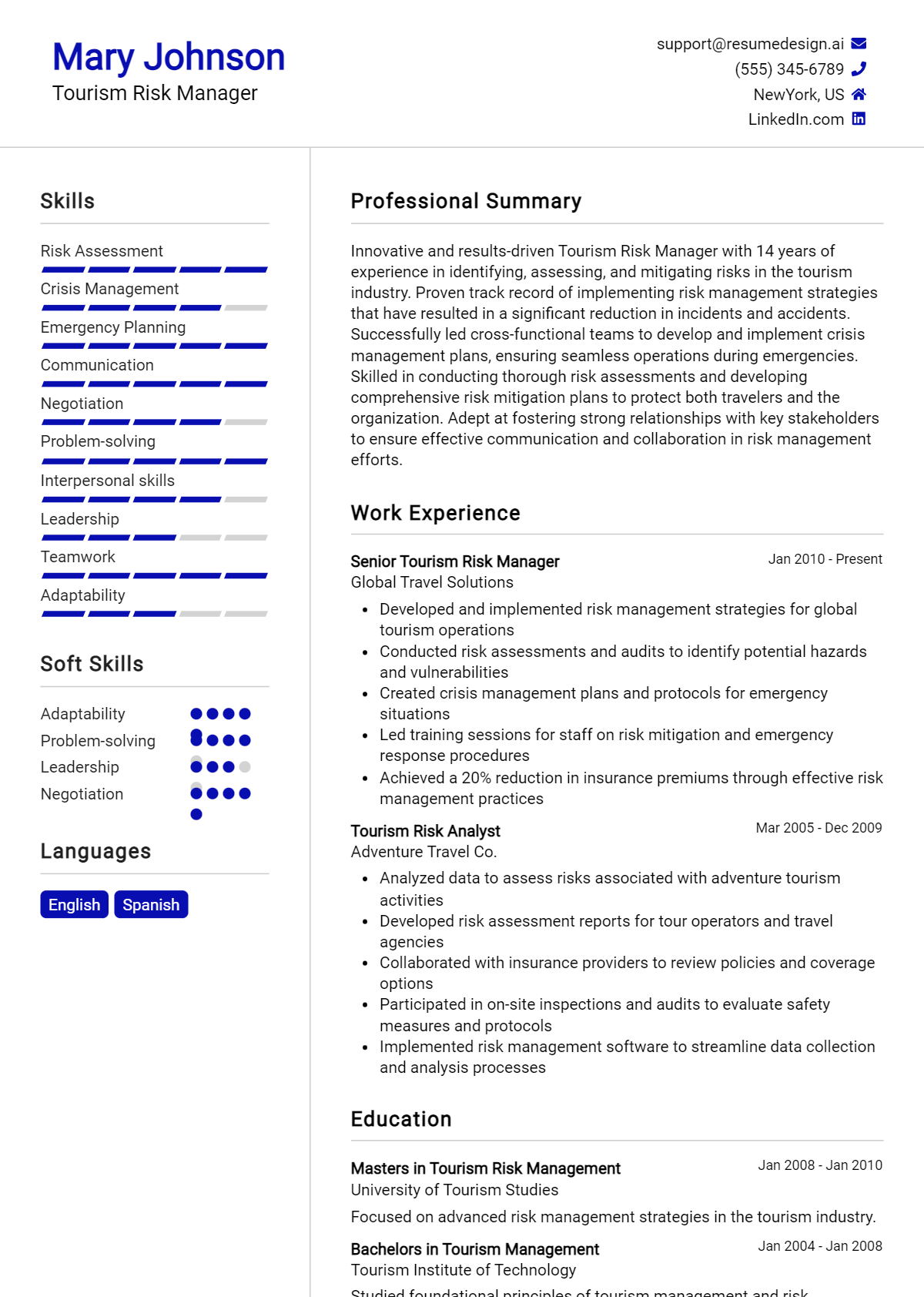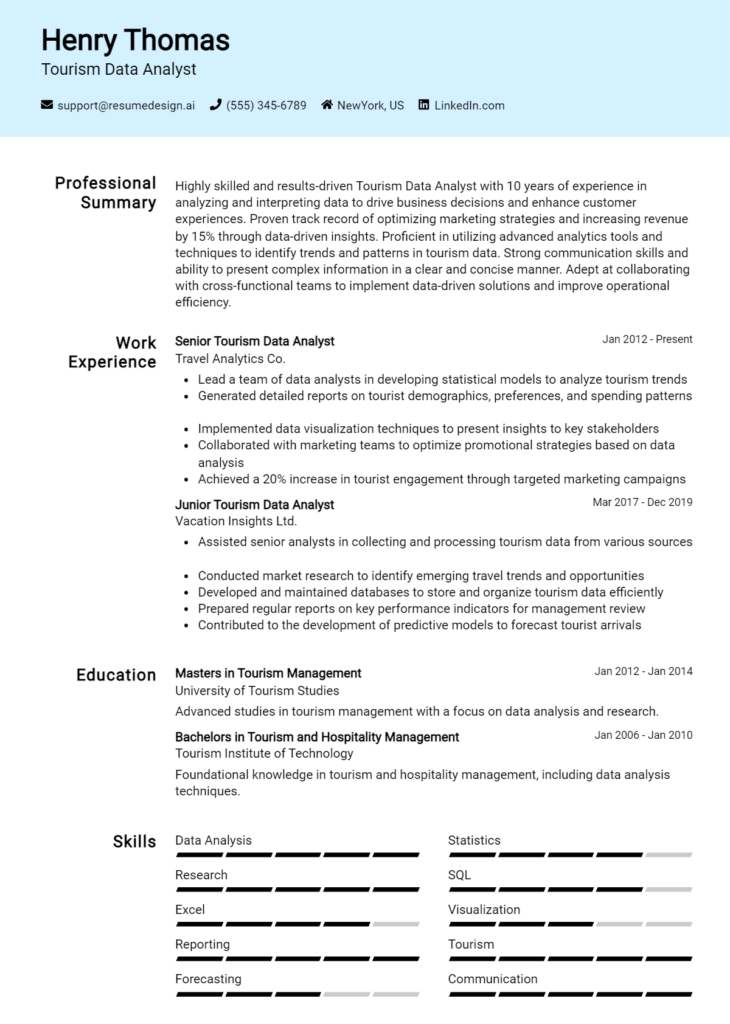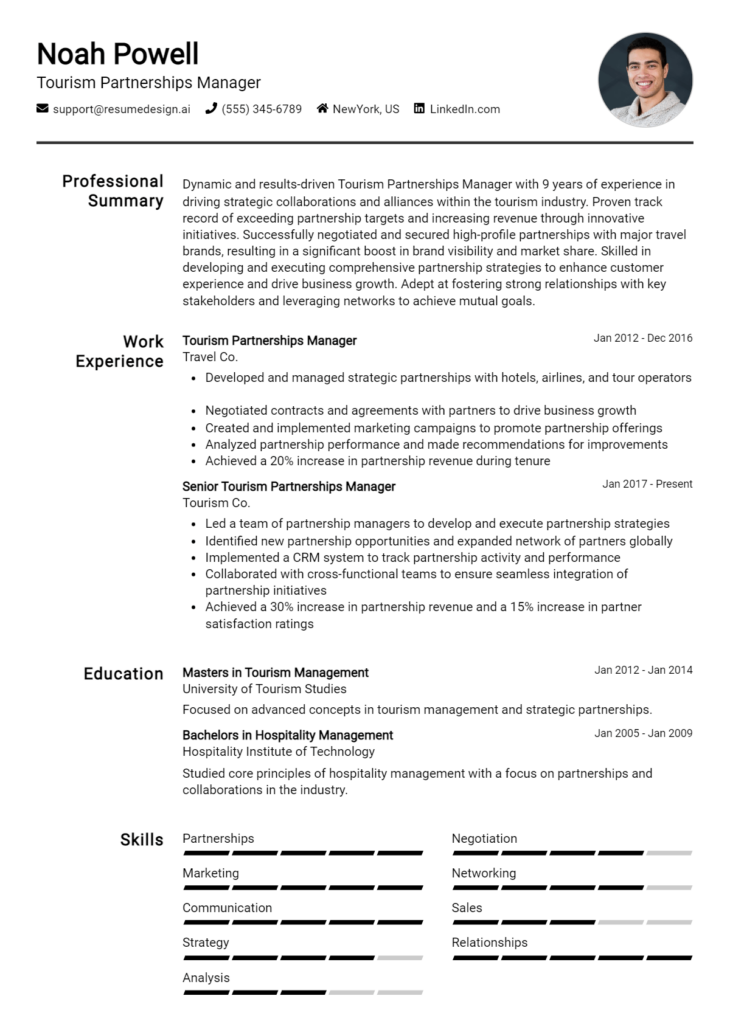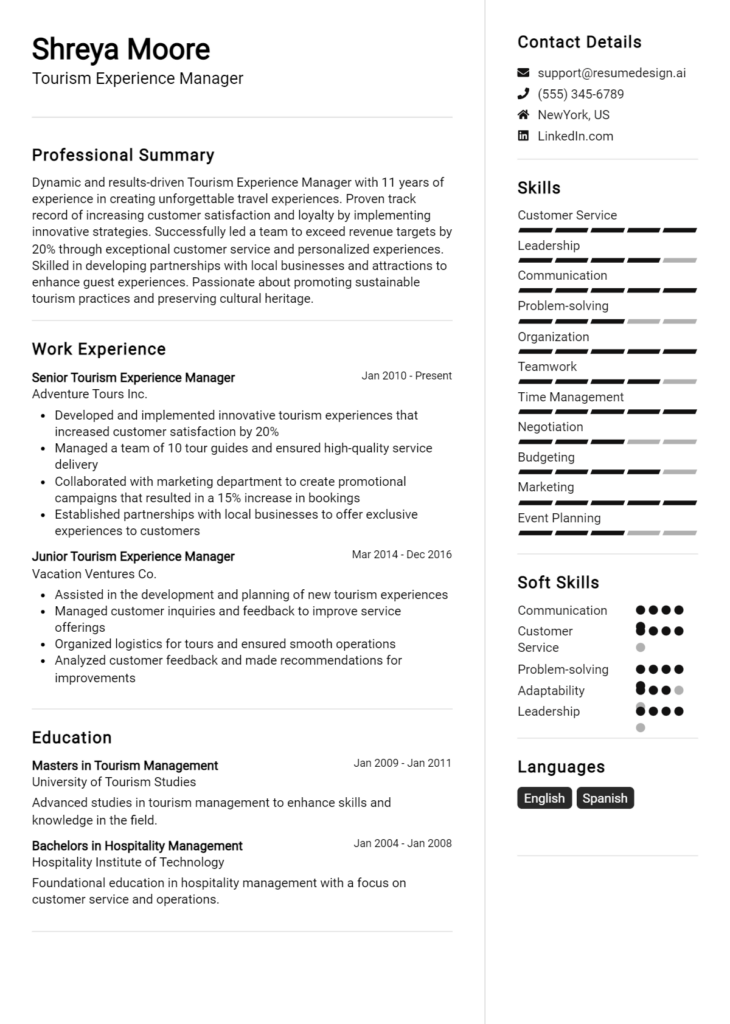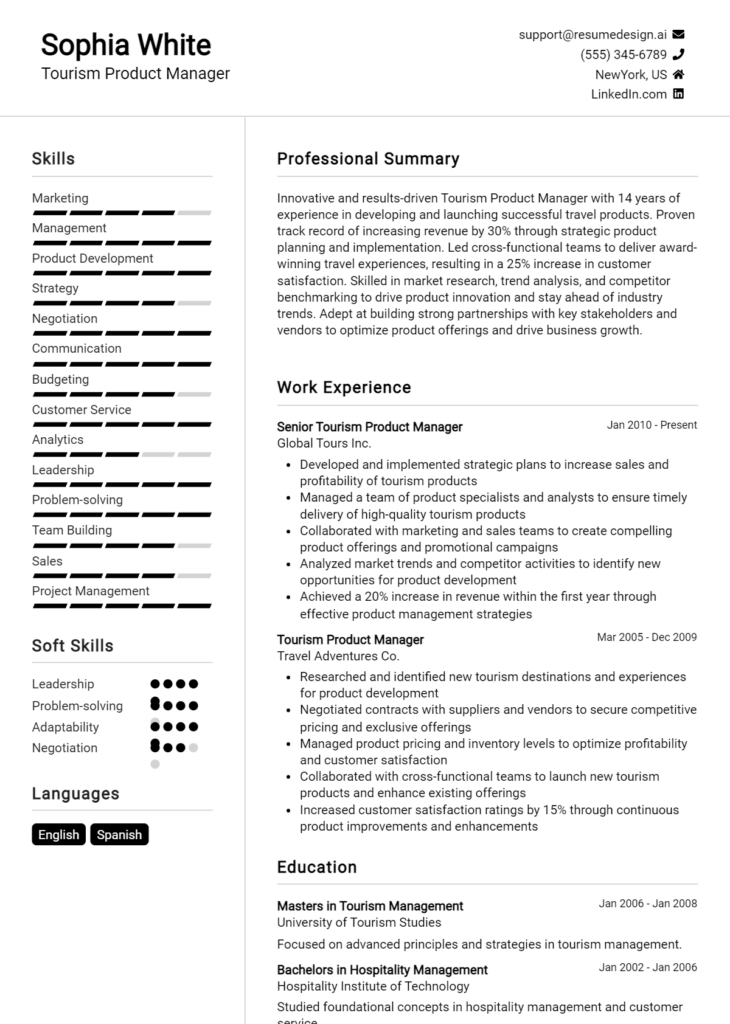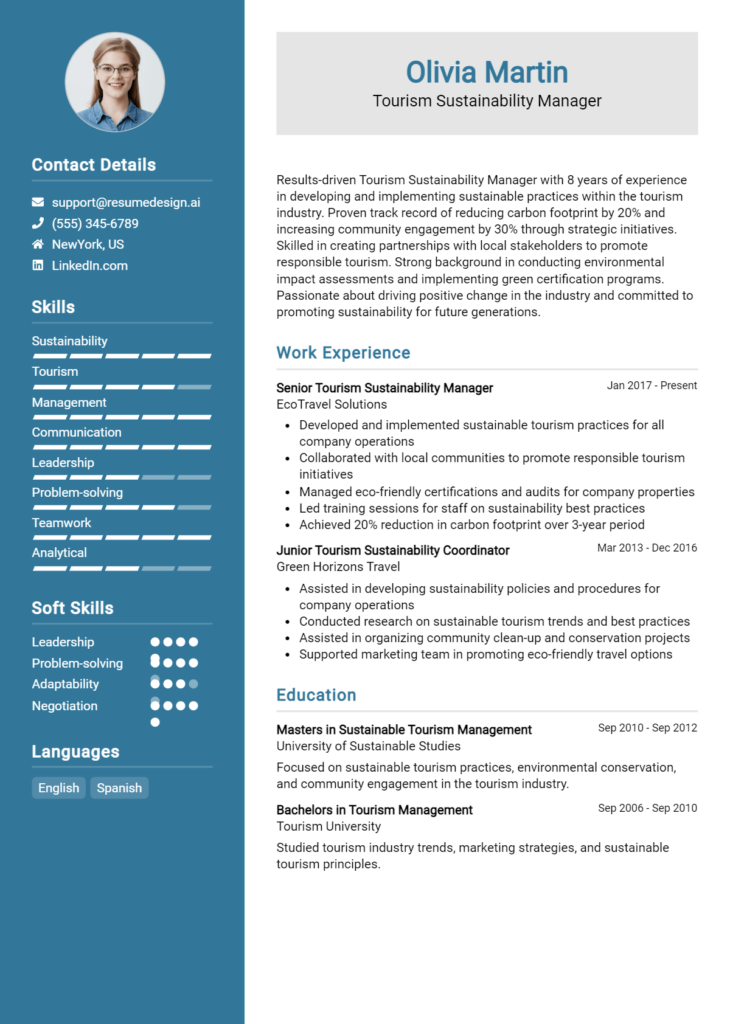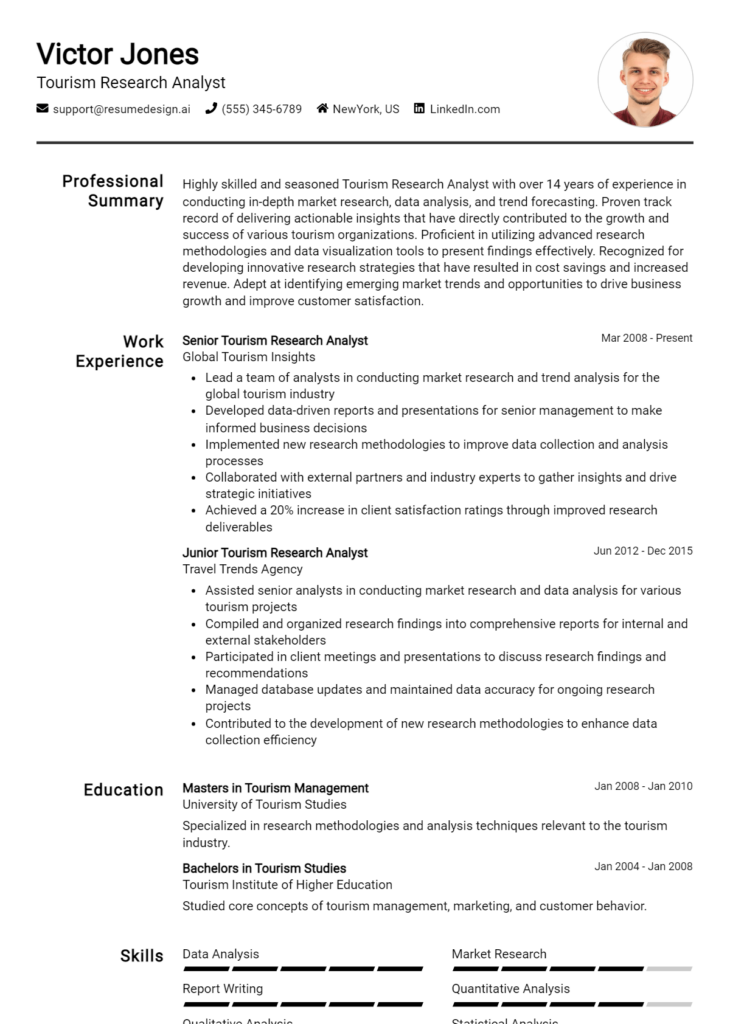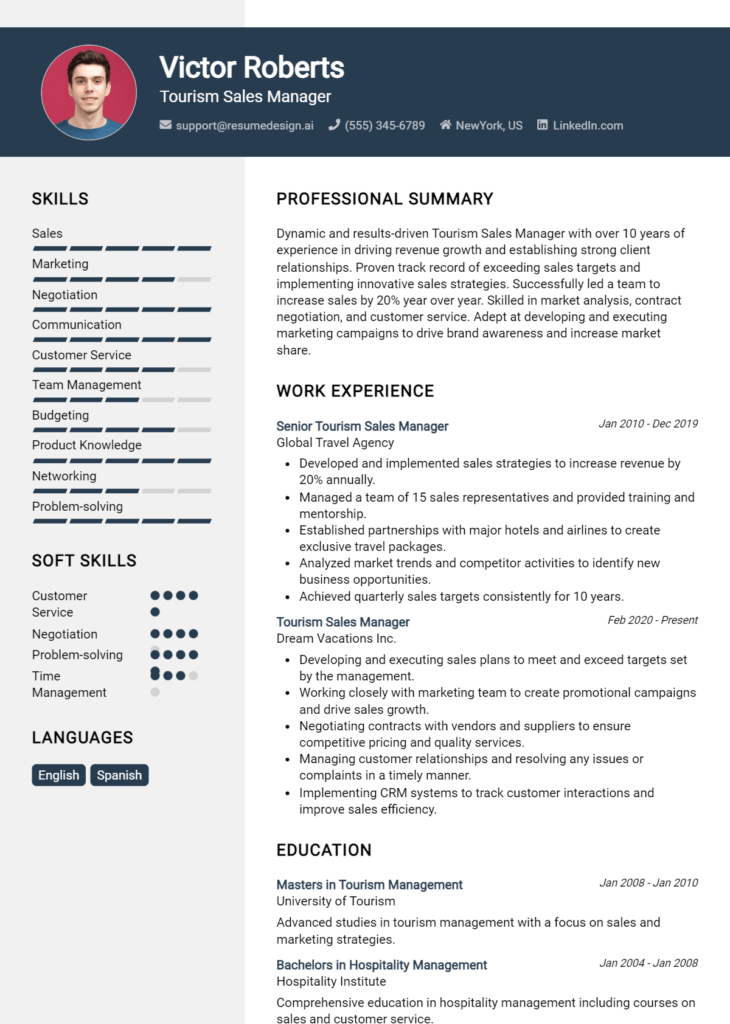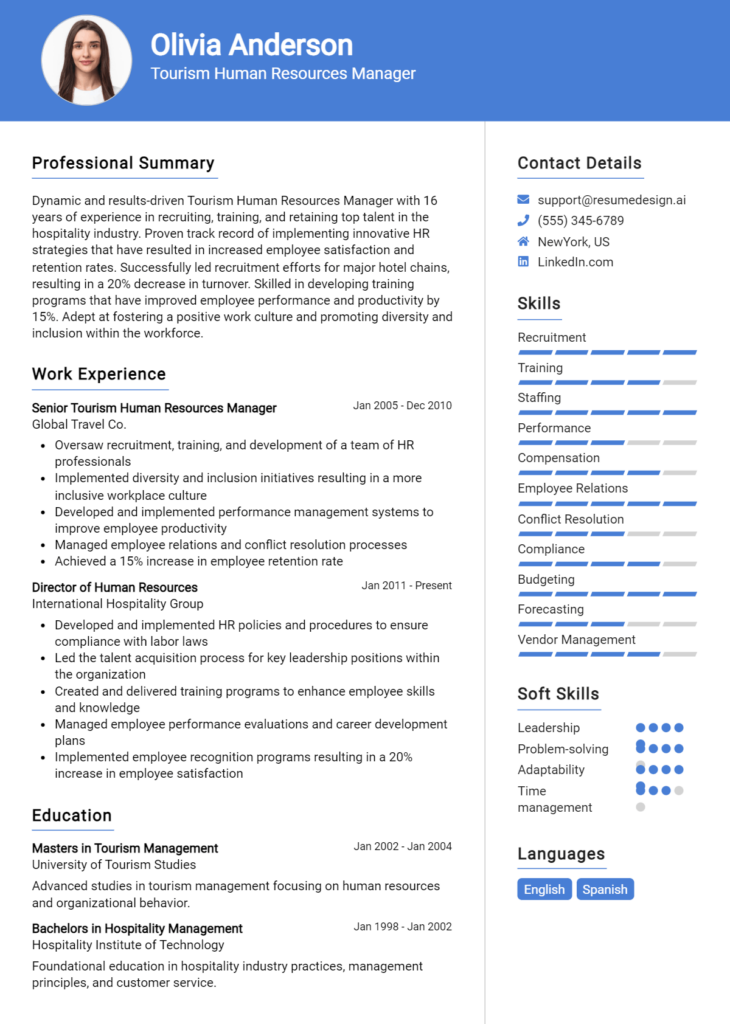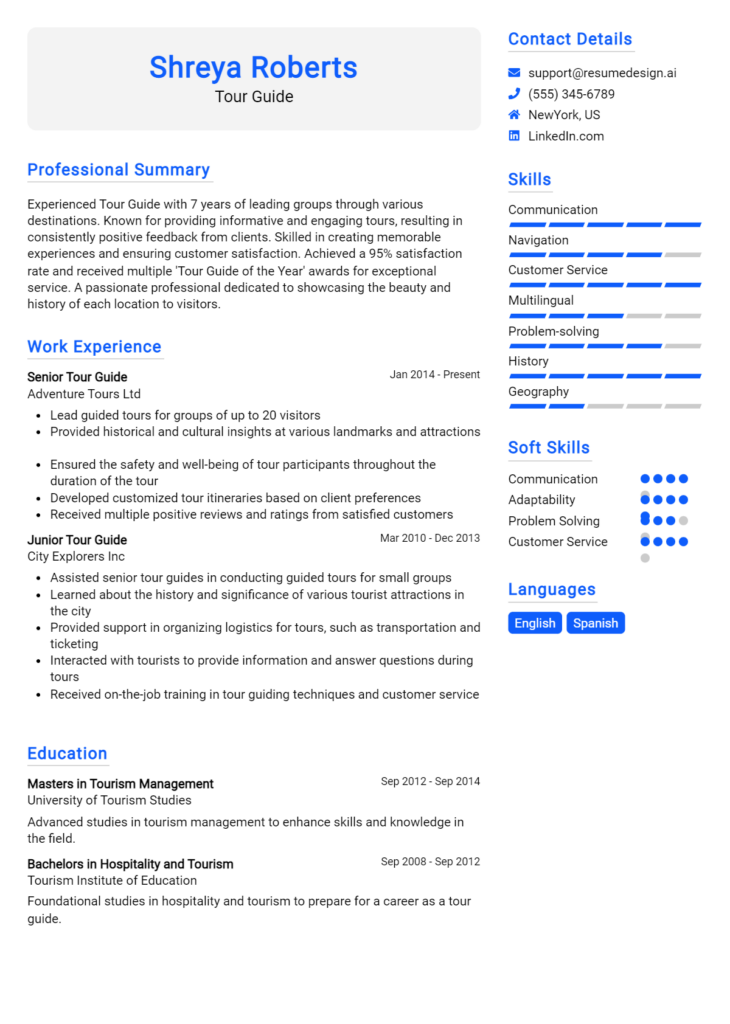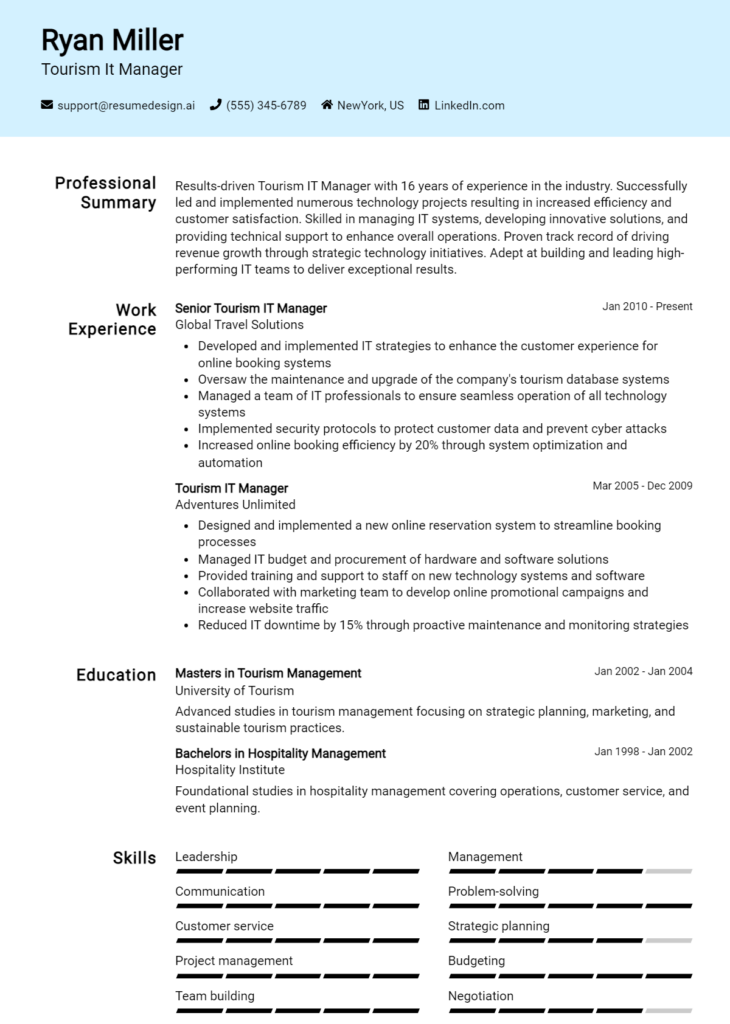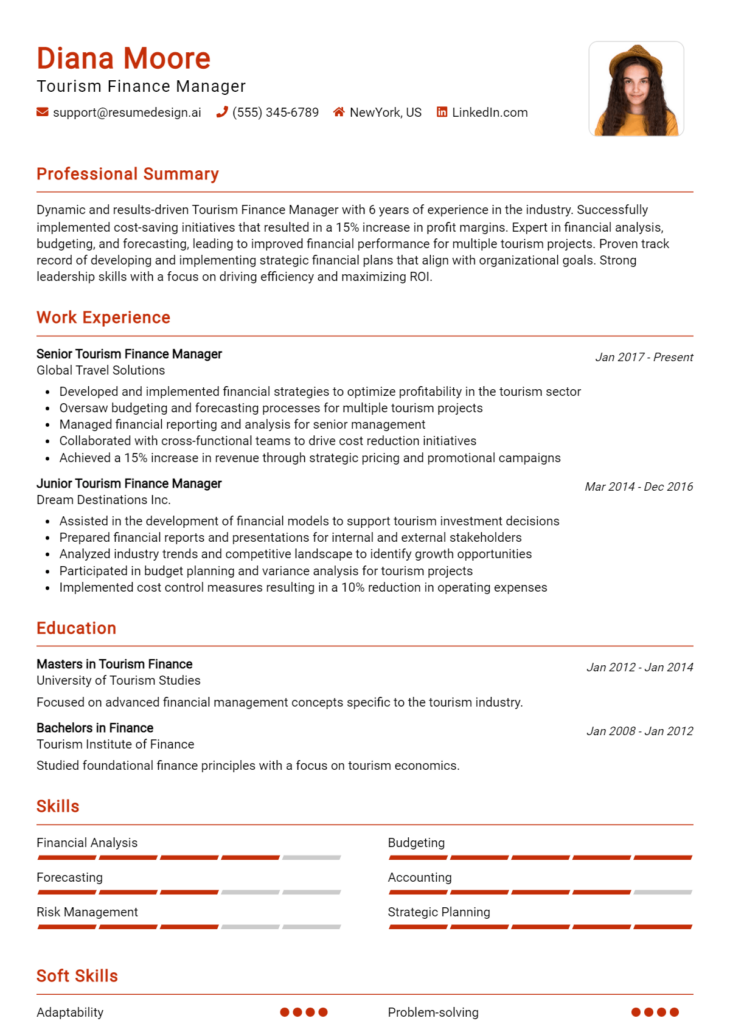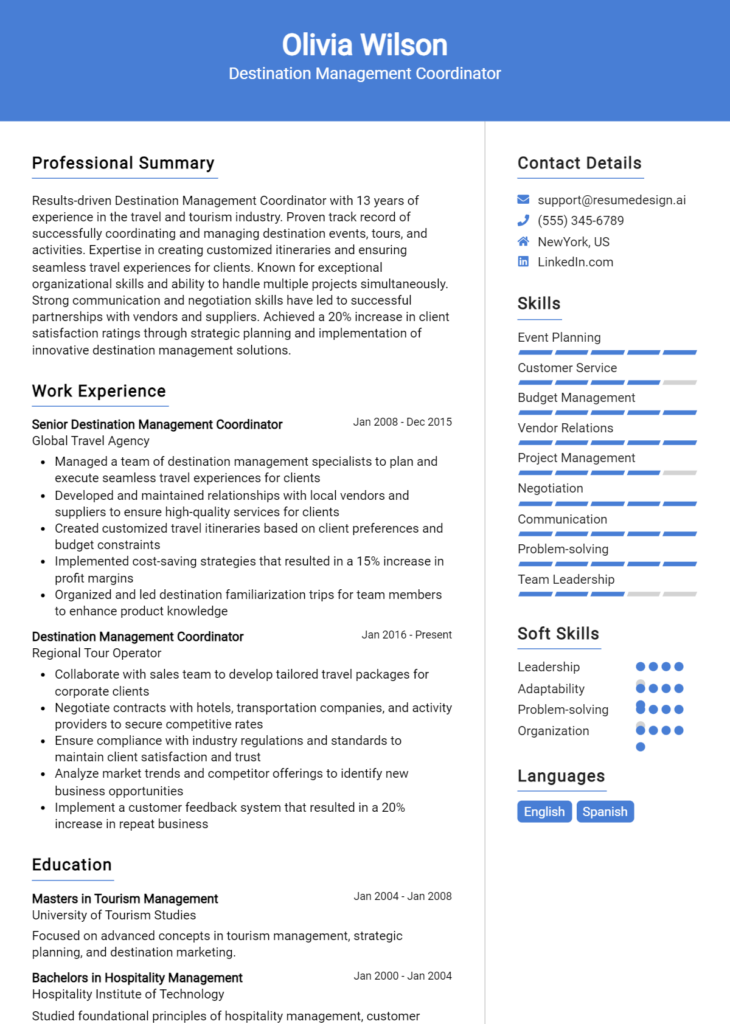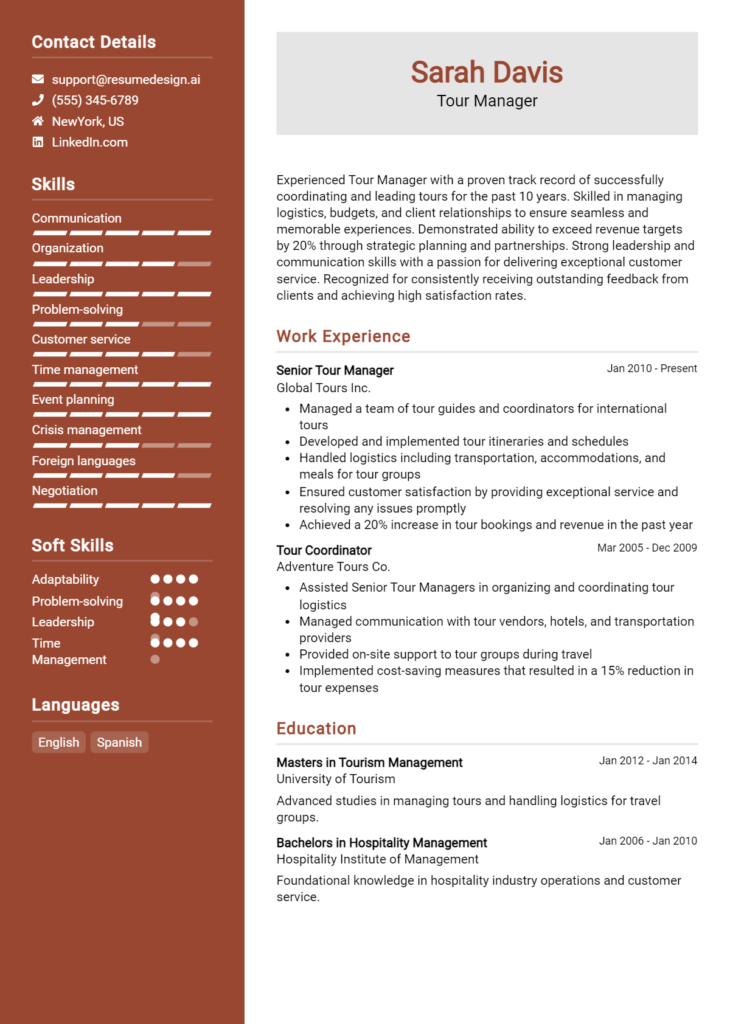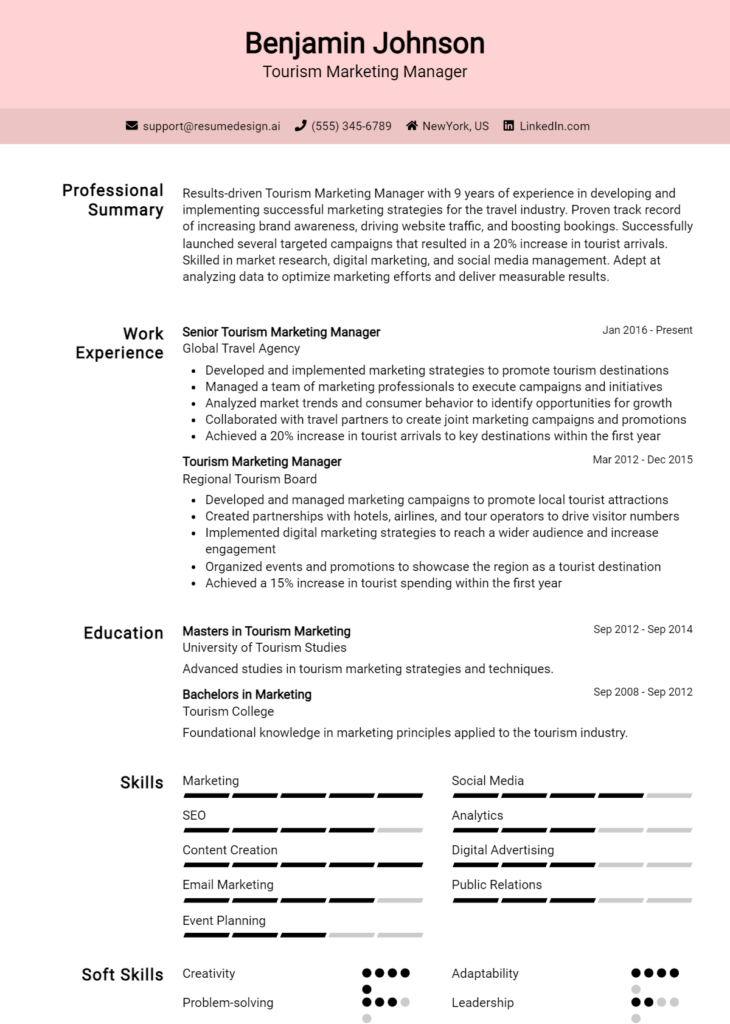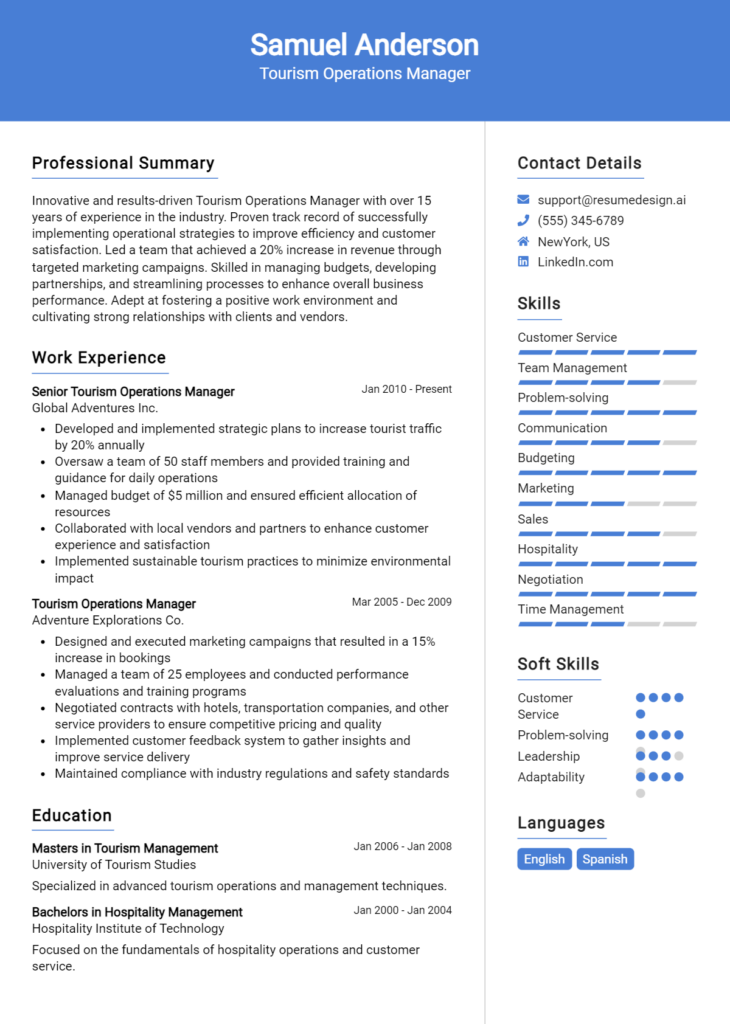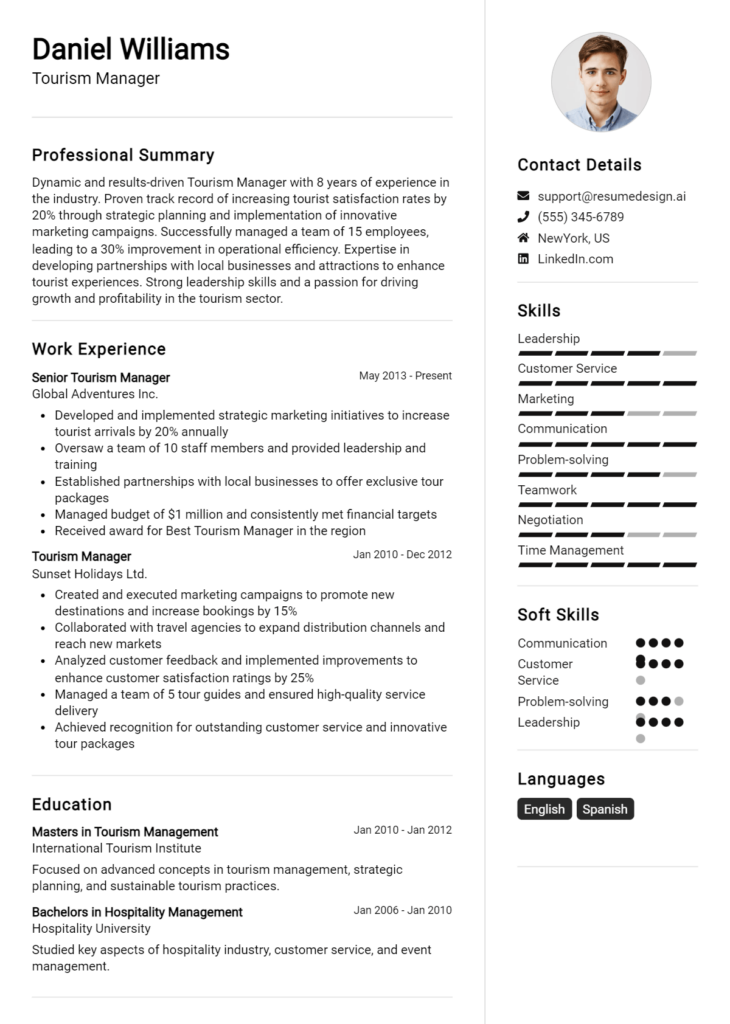Tourism Risk Manager Core Responsibilities
A Tourism Risk Manager plays a crucial role in safeguarding the interests of the organization by identifying, assessing, and mitigating potential risks associated with travel and tourism activities. This position requires strong technical knowledge, operational oversight, and exceptional problem-solving skills to effectively collaborate with various departments such as marketing, operations, and customer service. By developing risk management strategies, this professional ensures compliance and enhances safety, directly contributing to the organization's goals. A well-structured resume highlighting these qualifications can make a candidate stand out in a competitive job market.
Common Responsibilities Listed on Tourism Risk Manager Resume
- Conduct risk assessments to identify potential hazards in tourism operations.
- Develop and implement risk management strategies and policies.
- Collaborate with various departments to ensure compliance and safety.
- Monitor industry trends and regulatory changes affecting tourism risk.
- Prepare reports and presentations for stakeholders on risk management initiatives.
- Train staff on best practices for risk mitigation and emergency response.
- Evaluate insurance policies and coverage adequacy for tourism activities.
- Respond to incidents and manage crisis situations effectively.
- Conduct audits to assess the effectiveness of risk management strategies.
- Engage with local authorities and emergency services for coordinated responses.
- Maintain up-to-date knowledge of global travel advisories and safety protocols.
High-Level Resume Tips for Tourism Risk Manager Professionals
In the competitive field of tourism risk management, a well-crafted resume is crucial for standing out among candidates. This document often serves as the first impression a potential employer will have of you, making it essential that it accurately reflects both your skills and achievements. As a Tourism Risk Manager, your resume should not only highlight your expertise in identifying and mitigating risks but also demonstrate your ability to enhance the safety and experiences of travelers. This guide will provide practical and actionable resume tips specifically tailored for Tourism Risk Manager professionals, ensuring you put your best foot forward in your job search.
Top Resume Tips for Tourism Risk Manager Professionals
- Tailor your resume to the specific job description by incorporating keywords and phrases from the posting.
- Highlight your relevant experience in tourism, risk assessment, and crisis management to demonstrate your suitability for the role.
- Quantify your achievements, such as the percentage of risk reduction or the number of successful crisis interventions you've managed.
- Showcase your knowledge of industry regulations and standards, as well as any certifications relevant to tourism risk management.
- Include case studies or specific examples that illustrate your problem-solving skills and ability to navigate complex situations.
- Emphasize your communication and interpersonal skills, which are vital for collaborating with various stakeholders.
- Keep your resume concise and focused, ideally one page, while ensuring it remains easy to read and visually appealing.
- Utilize action verbs to convey your contributions effectively, such as "developed," "implemented," or "coordinated."
- Incorporate a professional summary at the top of your resume that succinctly captures your expertise and career goals.
- Proofread your resume multiple times to eliminate errors and ensure professionalism in your presentation.
By implementing these tips, you can significantly increase your chances of landing a job in the Tourism Risk Manager field. A well-structured, targeted resume that effectively showcases your qualifications and achievements will not only capture the attention of hiring managers but also demonstrate your readiness to contribute to the safety and security of the tourism industry.
Why Resume Headlines & Titles are Important for Tourism Risk Manager
In the competitive field of tourism management, the role of a Tourism Risk Manager is critical in safeguarding organizations against potential threats and ensuring the safety of travelers. A well-crafted resume headline or title is essential for candidates applying for this position, as it serves as the first impression on hiring managers. A strong headline not only captures attention but also succinctly summarizes a candidate's key qualifications in a compelling phrase. It should be concise, relevant, and directly aligned with the position being pursued, setting the tone for the rest of the resume and paving the way for further scrutiny of the applicant's skills and experiences.
Best Practices for Crafting Resume Headlines for Tourism Risk Manager
- Keep it concise: Aim for a headline that is no more than 10-12 words.
- Be role-specific: Include the title 'Tourism Risk Manager' to clearly define your area of expertise.
- Highlight key qualifications: Incorporate your most relevant skills and experiences.
- Use action words: Start with strong verbs to convey action and impact.
- Tailor for the job: Customize your headline for each application to reflect the job description.
- Showcase accomplishments: If possible, include quantifiable achievements to stand out.
- Avoid jargon: Use clear and straightforward language to ensure clarity.
- Make it memorable: Aim for a unique angle that sets you apart from other candidates.
Example Resume Headlines for Tourism Risk Manager
Strong Resume Headlines
Dynamic Tourism Risk Manager with 8+ Years of Experience in Crisis Management
Results-Driven Risk Management Expert Specializing in Travel Safety Solutions
Proven Track Record in Minimizing Risks and Enhancing Traveler Safety in Tourism
Strategic Tourism Risk Manager Focused on Sustainable Travel Practices
Weak Resume Headlines
Tourism Professional Looking for Work
Manager with Some Experience in Travel
Experienced Individual Seeking a Job in Tourism
The strong resume headlines are effective because they immediately communicate a clear and specific expertise, showcasing the candidate's relevant experience and unique qualifications. They are tailored to the role, making it easy for hiring managers to identify the candidate's fit for the position. In contrast, the weak headlines fail to impress due to their vagueness and lack of specificity. They do not convey any unique qualifications or experiences, making it difficult for hiring managers to see the candidate's value or relevance to the Tourism Risk Manager role.
Writing an Exceptional Tourism Risk Manager Resume Summary
A well-crafted resume summary is crucial for a Tourism Risk Manager, as it serves as the first impression to hiring managers. This brief introduction not only highlights the candidate's key skills and relevant experience but also showcases their accomplishments in the field of risk management within the tourism industry. A strong summary quickly captures attention, making it essential for candidates to be concise yet impactful, tailoring their summary to align with the specific job they are applying for. This focused approach can significantly enhance their chances of landing an interview.
Best Practices for Writing a Tourism Risk Manager Resume Summary
- Quantify Achievements: Use specific metrics to showcase your contributions and successes.
- Focus on Relevant Skills: Highlight crucial skills that align with the demands of tourism risk management.
- Tailor for the Job Description: Customize your summary to reflect the keywords and requirements of the job listing.
- Keep it Concise: Aim for 2-4 sentences that deliver maximum impact without unnecessary details.
- Showcase Industry Knowledge: Demonstrate your understanding of tourism risks and mitigation strategies.
- Use Action Verbs: Begin sentences with strong action verbs to convey confidence and proactivity.
- Highlight Leadership Experience: If applicable, note any leadership roles or team management experiences relevant to risk management.
- Maintain Professional Language: Use formal and professional language to convey seriousness and competence.
Example Tourism Risk Manager Resume Summaries
Strong Resume Summaries
Results-driven Tourism Risk Manager with over 8 years of experience in developing and implementing comprehensive risk assessment frameworks, resulting in a 30% reduction in incidents across managed destinations. Proven expertise in crisis management and regulatory compliance.
Dynamic professional with a track record of successfully managing risk portfolios for international travel companies. Achieved a 40% increase in stakeholder satisfaction through proactive risk mitigation strategies and effective communication protocols.
Detail-oriented Risk Manager with specialization in the tourism sector, adept at identifying potential threats and crafting actionable plans. Successfully led a team that reduced insurance claims by 25% through strategic risk assessments and training programs.
Weak Resume Summaries
Experienced manager looking for opportunities in tourism risk management. Capable of handling various tasks related to risk.
Tourism professional with some experience in risk management. Interested in contributing to a team and learning more.
The examples above illustrate the differences between strong and weak resume summaries. Strong summaries provide specific, quantifiable achievements and a clear presentation of relevant skills, demonstrating the candidate's value to potential employers. In contrast, weak summaries lack detail, specificity, and fail to convey the candidate's qualifications effectively, making them less appealing to hiring managers.
Work Experience Section for Tourism Risk Manager Resume
The work experience section of a Tourism Risk Manager resume is a critical component that provides potential employers with insights into a candidate's practical expertise and accomplishments within the industry. This section effectively highlights the applicant's technical skills in risk assessment and management, their ability to lead teams in high-pressure situations, and their track record of delivering high-quality risk mitigation strategies. Quantifying achievements, such as cost savings or risk reduction percentages, and ensuring alignment with industry standards are crucial for demonstrating the candidate's impact and suitability for the role.
Best Practices for Tourism Risk Manager Work Experience
- Focus on specific technical skills relevant to risk management, such as data analysis, crisis management, and regulatory compliance.
- Quantify achievements whenever possible, using metrics like percentage reductions in incidents or cost savings generated through risk management initiatives.
- Highlight leadership roles and team collaboration, emphasizing how you effectively managed cross-functional teams during risk assessments.
- Utilize action verbs to convey dynamism and proactivity in your contributions.
- Align your experiences with industry standards and best practices in tourism risk management to demonstrate your knowledge and commitment.
- Include relevant certifications or training that further enhance your technical expertise and credibility in the field.
- Tailor your work experience to the specific job description, focusing on the most pertinent experiences that match the employer's needs.
- Showcase your problem-solving abilities by detailing specific challenges faced and the innovative solutions you implemented.
Example Work Experiences for Tourism Risk Manager
Strong Experiences
- Led a team of 10 in conducting comprehensive risk assessments for a major tourism company, resulting in a 30% reduction in safety incidents over two years.
- Developed and implemented a crisis management plan that improved response times by 40%, safeguarding travelers during unforeseen events.
- Collaborated with local authorities to create a risk mitigation strategy that decreased insurance costs by 25% while enhancing safety protocols.
- Facilitated training sessions for 100+ staff members on emergency preparedness, significantly increasing overall team readiness and competency.
Weak Experiences
- Assisted in some risk management tasks without specifying the outcomes or contributions made.
- Worked on a team but did not describe the role played or any significant achievements.
- Participated in training sessions that were not tied to measurable improvements in team performance or safety.
- Involved in risk assessments occasionally, with no details on the impact or results of those assessments.
The examples of strong experiences illustrate clear, quantifiable outcomes and specific leadership roles that demonstrate a proactive approach to tourism risk management. In contrast, the weak experiences lack detail, measurable results, and a clear portrayal of the candidate’s contributions, making them less compelling to potential employers. Strong experiences provide a narrative of success and capability, while weak experiences fail to convey the candidate's value in a competitive field.
Education and Certifications Section for Tourism Risk Manager Resume
The education and certifications section of a Tourism Risk Manager resume is crucial in establishing the candidate's academic prowess and professional credentials. This section not only showcases the foundational knowledge acquired through formal education but also emphasizes industry-relevant certifications and ongoing learning efforts that are essential in a constantly evolving field like tourism. By including specific coursework, certifications, and specialized training, candidates can significantly enhance their credibility, demonstrating their commitment to the profession and their alignment with the specific demands of the Tourism Risk Manager role.
Best Practices for Tourism Risk Manager Education and Certifications
- Include relevant degrees such as a Bachelor's or Master's in Tourism Management, Business Administration, or Risk Management.
- Highlight industry-recognized certifications, such as Certified Risk Manager (CRM) or Certified Tourism Risk Manager (CTRM).
- Detail specific coursework that pertains to risk assessment, crisis management, or travel safety.
- Keep the section concise but informative, focusing on the most pertinent qualifications.
- List certifications in order of relevance to the job role, placing the most significant ones at the top.
- Include dates of completion for certifications to demonstrate current knowledge and qualifications.
- Consider adding professional development courses related to emerging trends in tourism risk management.
- Use bullet points for clarity and ease of reading, allowing the hiring manager to quickly assess qualifications.
Example Education and Certifications for Tourism Risk Manager
Strong Examples
- Bachelor of Science in Tourism Management, ABC University, 2018
- Certified Risk Manager (CRM), Risk Management Society, 2021
- Coursework in Crisis Management and Emergency Response, DEF Institute, 2020
- Certified Tourism Risk Manager (CTRM), International Tourism Risk Association, 2022
Weak Examples
- Associate Degree in General Studies, GHI College, 2016
- Certification in Basic First Aid, Red Cross, 2015
- Bachelor of Arts in English Literature, JKL University, 2014
- Online Course in Social Media Marketing, MNO Academy, 2020
The strong examples listed demonstrate relevant educational qualifications and certifications that align closely with the responsibilities of a Tourism Risk Manager. They reflect a focus on risk management principles and specialized training that is applicable to the tourism sector. In contrast, the weak examples highlight qualifications that are either outdated, irrelevant, or not directly related to the field of tourism risk management, which could detract from the candidate’s appeal to potential employers.
Top Skills & Keywords for Tourism Risk Manager Resume
In the dynamic field of tourism, the role of a Tourism Risk Manager is crucial for ensuring the safety and security of travelers, businesses, and destinations alike. Crafting a compelling resume that showcases relevant skills is essential for standing out to potential employers. Highlighting both hard and soft skills effectively communicates your ability to navigate the complexities of risk management in the tourism sector. A well-rounded skill set not only demonstrates your expertise but also your adaptability to various challenges that may arise in this ever-evolving industry.
Top Hard & Soft Skills for Tourism Risk Manager
Soft Skills
- Excellent communication skills
- Strong analytical thinking
- Problem-solving abilities
- Leadership and team management
- Attention to detail
- Cultural sensitivity
- Adaptability and flexibility
- Conflict resolution
- Time management
- Interpersonal skills
Hard Skills
- Proficiency in risk assessment tools
- Knowledge of safety regulations and protocols
- Crisis management planning
- Data analysis and interpretation
- Emergency response planning
- Familiarity with insurance policies
- Proficient in project management software
- Understanding of the tourism industry trends
- Geographic information systems (GIS) usage
- Financial risk management
By effectively emphasizing these skills in your resume, along with relevant work experience, you can present yourself as a highly qualified candidate for the role of a Tourism Risk Manager.
Stand Out with a Winning Tourism Risk Manager Cover Letter
As a dedicated professional with a robust background in risk management within the tourism sector, I am excited to apply for the Tourism Risk Manager position. My extensive experience in identifying, assessing, and mitigating risks has equipped me with the skills necessary to safeguard both travelers and organizations in an ever-evolving landscape. I am particularly drawn to this role due to its potential to enhance safety protocols and ensure compliance with industry regulations while fostering a seamless travel experience for clients.
In my previous position at [Previous Company Name], I successfully developed and implemented a comprehensive risk assessment framework that reduced incident reports by 30% over two years. This achievement was made possible through meticulous data analysis, stakeholder collaboration, and the establishment of clear communication channels. I am adept at training staff on risk awareness and emergency response strategies, ensuring that all team members understand their roles in maintaining a secure environment. My proactive approach to risk management has not only improved safety outcomes but also positively impacted customer satisfaction and trust.
Furthermore, my ability to navigate complex regulatory environments and international travel policies will be invaluable in this role. I have a proven track record of working closely with governmental agencies, local authorities, and industry partners to develop effective crisis management plans. My strong analytical skills allow me to stay ahead of potential threats, while my passion for the tourism industry drives me to continually seek innovative solutions that enhance traveler safety. I am eager to bring my expertise to your organization and contribute to its commitment to excellence in tourism risk management.
Thank you for considering my application. I am looking forward to the opportunity to discuss how my background, skills, and enthusiasm for travel risk management align with the goals of your team. I am excited about the possibility of contributing to a safer and more secure travel experience for all.
Common Mistakes to Avoid in a Tourism Risk Manager Resume
When crafting a resume for the role of a Tourism Risk Manager, it’s crucial to present your skills and experiences effectively. Many candidates make common mistakes that can hinder their chances of landing an interview. Understanding these pitfalls can help you create a more compelling resume that showcases your qualifications and expertise in managing risks within the tourism industry. Here are some common mistakes to avoid:
Lack of Specificity: Vague descriptions of past roles can diminish the impact of your experiences. Clearly outline your responsibilities and achievements with specific examples.
Ignoring Relevant Keywords: Failing to incorporate industry-specific terminology and keywords can result in your resume being overlooked by Applicant Tracking Systems. Tailor your resume to align with the job description.
Overloading with Jargon: While it's important to use specific terms, excessive jargon can make your resume difficult to understand. Balance technical language with clear explanations.
Neglecting Soft Skills: Focusing solely on technical skills can overlook crucial soft skills like communication, leadership, and crisis management, which are essential for a Tourism Risk Manager.
Not Quantifying Achievements: Resumes that lack measurable outcomes can appear less impressive. Use numbers to demonstrate the impact of your work, such as percentage reductions in incidents or improved safety ratings.
Inconsistent Formatting: An unprofessional layout can distract from your qualifications. Ensure consistency in font, size, and style to create a clean, organized presentation.
Skipping a Summary or Objective: Omitting a summary or objective statement can leave employers unclear about your career goals and suitability for the role. A concise statement can set the tone for your resume.
Failing to Tailor for Each Application: Sending out a generic resume can diminish your chances. Customize your resume for each job application to highlight the most relevant skills and experiences that match the job description.
Conclusion
As a Tourism Risk Manager, your role is crucial in ensuring the safety and security of travelers while managing potential risks associated with tourism activities. Key responsibilities include identifying and assessing risks, developing strategies to mitigate those risks, and collaborating with various stakeholders, including government agencies and tourism businesses. Staying informed about potential threats, such as natural disasters, political instability, and health emergencies, is essential to safeguard both tourists and the reputation of the tourism industry.
In this dynamic field, having a well-crafted resume is vital for standing out to potential employers. Highlight your skills in risk assessment, crisis management, and communication, as these are key attributes sought after in this role. It’s also important to showcase your experience in dealing with emergencies and your understanding of the travel industry.
Now is the perfect time to review and enhance your Tourism Risk Manager resume. Utilize tools like resume templates, which can provide a professional layout that highlights your strengths. Consider using a resume builder to easily customize your information and ensure it's up-to-date. Additionally, explore resume examples for inspiration and guidance on what employers are looking for. Don’t forget to craft a compelling cover letter using our cover letter templates to further bolster your application.
Take action today and make sure your resume reflects your expertise as a Tourism Risk Manager. Your next career opportunity may be just around the corner!

